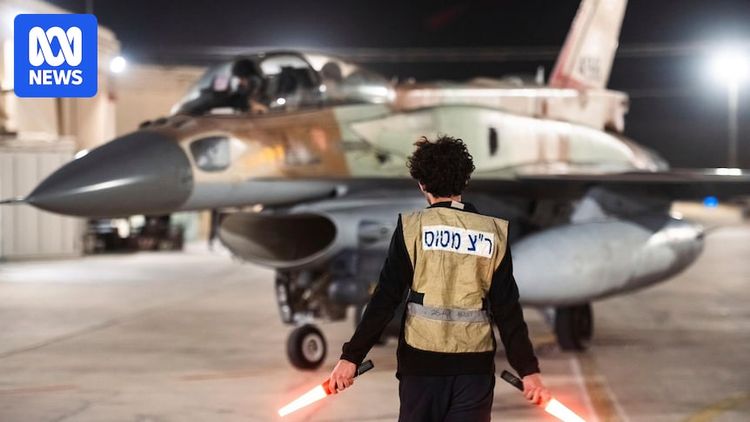Iran says Israeli air strike on military sites caused limited damage

Iran has played down Israel's air attack against Iranian military targets, saying it caused only limited damage.
US President Joe Biden called for a halt to military escalation that had raised fears of an all-out conflagration in the Middle East.
Scores of Israeli jets completed three waves of strikes before dawn on Saturday against missile factories and other sites near Tehran and in western Iran, Israel's military said.
It was retaliation for Iran's October 1 attack on Israel with about 200 ballistic missiles, and Israel warned its heavily armed archenemy not to hit back after the latest strike.
Prime Minister Anthony Albanese said Israel had the right to retaliate.
"What I do is join with the US secretary of state and Prime Minister [Keir] Starmer to work towards a de-escalation in the Middle East," he said.
"I think that is what everyone wants to see and certainly at CHOGM (the Commonwealth Heads of Government Meeting) that was the common view."
Iran condemned the Israeli raid and its foreign ministry said Iran was "entitled and obligated" to defend itself.
But it added that it "recognises its responsibilities towards regional peace and security", a more conciliatory statement than after previous bouts of escalation.
Iran says Israeli planes 'prevented from entering' airspaceIran's military said the Israeli warplanes used "very light warheads" to target border radar systems in the provinces of Ilam and Khuzestan and around Tehran.
"Enemy planes were prevented from entering the country's airspace … and the attack caused limited damage," Iran's military joint staff said in a statement.
David Albright, a former UN nuclear weapons inspector, said low-resolution commercial satellite imagery appeared to show that one Israeli strike hit the sprawling Parchin military complex near Tehran, damaging three buildings, including two where solid fuel was mixed for ballistic missile engines.
Decker Eveleth, an associate research analyst at CNA, a Washington think tank, said Israel also hit Khojir, a large missile production site near Tehran.
Tensions between Iran and Israel have grown rapidly since the October 7, 2023, attack on Israel by Iran-backed Hamas, raising fears of a wider regional conflict that could drag in global powers and imperil world energy supplies.
Worsening conflict in Lebanon, where Israel is waging an intense campaign against Iran's main regional ally Hezbollah to stop it firing rockets into northern Israel, has raised the temperature still further.
The United States, which had pressed Israel to avoid targeting sensitive Iranian energy and nuclear sites, joined other countries in calling for a halt to the cycle of confrontation between Israel and Iran.
Israeli Prime Minister Benjamin Netanyahu said on Saturday that Israel had chosen the targets in Iran based on its national interests, not according to what was dictated by the United States.
Mr Biden said the strikes appeared to only hit military targets and he added he hoped they were "the end".
Harris calls for de-escalationUS Vice-President Kamala Harris, who hopes to succeed Mr Biden by winning the November 5 US presidential election, said it was "the strong perspective of the United States that there must be de-escalation".
Two regional officials briefed by Iran told Reuters that several high-level meetings were held in Tehran to determine the scope of Iran's response.
One official said the damage was "very minimal" but added that several Revolutionary Guard bases in and around Tehran were also hit.
Iranian news sites aired footage of passengers at Tehran's Mehrabad Airport, seemingly meant to show there was little impact.
Israel's military, signalling it did not expect an immediate Iranian response, said there was no change to public safety restrictions across the country.
Israel says it struck military sitesBeni Sabti, an Iran expert at Tel Aviv's Institute for National Security Studies, said the Israeli strike appeared designed to give Tehran an opportunity to avoid further escalation.
"We see that Israel wants to close this event, to pass this message to Iran that it is closed and we don't want to escalate it," he said.
Videos carried by Iranian media showed air defence systems continuously firing at apparently incoming projectiles in central Tehran, without saying which sites were coming under attack.
Israel's military said its jets had struck missile manufacturing facilities and surface-to-air missile arrays before safely returning home.
"If the regime in Iran were to make the mistake of beginning a new round of escalation, we will be obligated to respond," the military said.
US Defense Secretary Lloyd Austin said in a statement Iran "should not make the mistake of responding to Israel's strikes".
Mr Austin said he also stressed in a call with his Israeli counterpart diplomatic opportunities to lower tensions in the region, including in Gaza and Lebanon.
Israel notified the US before striking, but Washington was not involved in the operation, a US official told Reuters.
Targets did not include energy infrastructure or Iran's nuclear facilities, a US official said.
Reuters









































